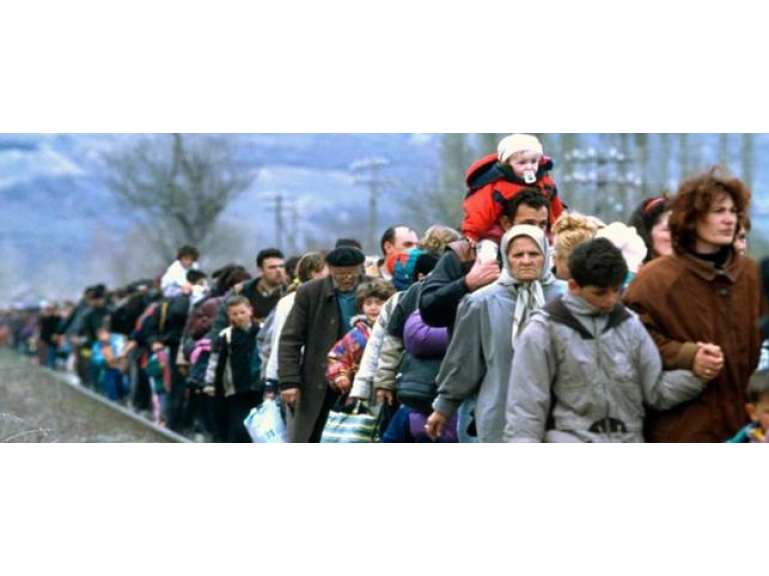Press Release on the issue of granting Russian citizenship to Donbass residents in Ukraine
In connection with the realizing introduction of a simplified procedure for the admission to the citizenship of the Russian Federation of persons permanently residing in the territories of certain areas of the Donetsk and Lugansk regions of Ukraine (the territory of the DPR and the LPR), the available grounds and reasons for this are presented as follows.
1. Humanitarian grounds. Official Kiev calls residents of Donetsk and Lugansk regions of Ukraine terrorists and separatists. However, it is important to understand that the inhabitants of the so-called Donetsk and Lugansk People’s Republics did not commit terrorist acts, did not take hostages, did not threaten with physical violence to officials of official Kiev and did not try to achieve political decisions through violence and threats.
People are trying to protect themselves and their children fr om encroachment on their rights - the rights to life, a fair trial, a ban on the use of torture, identity, lifestyle, language, own world outlook.
2. The lack of prospects for improving the situation in the conflict zone. Despite the agreement on a civilized solution (the Minsk Agreement) of the conflict in the east of Ukraine, it is not possible to achieve a complete and comprehensive cease-fire. The situation is aggravated by the measures taken by the Ukrainian authorities in March 2017 to tighten and legitimize the socio-economic blockade of Donbass, which they have de facto carried out together with radical nationalists since 2015.
According to estimates by the United Nations Office for the Coordination of Humanitarian Affairs, at the end of 2018, the number of persons affected by the conflict in southeastern Ukraine was 5.4 million, of which 3.5 million needed humanitarian assistance. About 600 thousand people live directly along the contact line, including 100 thousand children.
It is important to note that Russia does not impose citizenship on the residents of Donbass, but gives them the opportunity to voluntarily and independently apply in the prescribed manner to the competent authorities in Russia.
3. Exclusion of residents of Donbass from the political process in Ukraine. The deliberate failure of the presidential elections in Ukraine in certain areas of the Donetsk and Lugansk regions of Ukraine on March 31, 2019 completely excluded several million Ukrainians (according to the Central Election Commission of Ukraine, we are talking about three million potential voters) from the electoral process, effectively limiting entire regions to civil rights.
Polling stations also did not open in Russia, wh ere there are no security problems.
All of the above was the final confirmation of the complete unwillingness of Kiev to integrate the inhabitants of the eastern regions of the country into the Ukrainian state.
4. Legal grounds for the application of the simplified procedure for admission to the citizenship of the Russian Federation. Such procedure can be applied in accordance with Article 14 of the Federal Law “On Citizenship of the Russian Federation”, which provides the possibility of admission to the citizenship of the Russian Federation in a simplified manner. According to the first part of Article 29 of the Law, the Russian President for humanitarian purposes has the right to determine the categories of foreign citizens and stateless persons who have the right to apply for admission to the citizenship of the Russian Federation in a simplified manner.
5. Compliance with generally accepted principles and norms of international law. In accordance with the European Convention on Citizenship of 1996, each state has the right to determine in its legislation who its citizens are. Article 15 of the Universal Declaration of Human Rights states that no one may be arbitrarily deprived of his citizenship or the right to change his citizenship.
6. Compliance with the Minsk agreements. The Minsk agreements, approved by the UN Security Council, remain the only alternative to the peaceful resolution of the internal Ukrainian conflict. Russia calls on all parties - Kiev, Donetsk and Lugansk - to intensify efforts within the framework of the Minsk contact group for the unconditional and consistent implementation of their commitments.
7. Projection on the situation in Russia. The provision of all guaranteed measures of support to “new citizens” will in no way affect the existing level of social protection for Russians, taking into account, inter alia, the development and implementation of additional measures of social policy.
8. Non-unique solutions. Since 2009, certain categories of Ukrainian citizens have been granted Romanian citizenship; in recent years, Hungary has been actively helping its compatriots. In the conditions of a difficult humanitarian situation in the south-east of Ukraine, Russia cannot stand aside and leave to the destiny the people of a single culture with it.
the Embassy of the Russian Federation
in the Republic of Botswana

